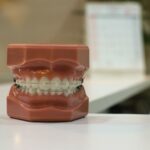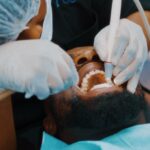Are you currently wearing braces and struggling to maintain good oral hygiene? Don’t worry, we’ve got you covered! In this article, we will provide you with practical tips and step-by-step instructions on how to floss effectively with braces. With years of experience in the field of orthodontics and a deep understanding of dental health, our knowledgeable author will guide you through the process of maintaining your oral health while wearing braces. Say goodbye to food particles stuck in your brackets and hello to a clean and healthy smile. Let’s dive into our comprehensive guide on how to floss effectively with braces.

How to Floss with Braces
Maintaining oral hygiene is essential when you have braces. Flossing, alongside regular brushing, helps remove food particles and plaque that can accumulate around your braces and between your teeth. While it may seem tricky at first, with the right technique and tools, flossing with braces can be done effectively. In this article, we will guide you through the steps and provide practical tips to help you master the art of flossing with braces.
Using the Right Floss and Accessories
When it comes to flossing with braces, it’s important to choose the right type of floss. Waxed floss is an excellent option as it is less likely to get caught on your braces. Alternatively, you can use a floss threader, which helps you thread the floss behind the brace wire and reach the areas between your teeth. Another option is using a waterpik or oral irrigator, which uses a stream of water to clean around your braces.
The Step-by-Step Process
Start by ripping off a piece of floss about 18 inches in length. This ensures you have enough floss to work with as you go through each tooth.
If you’re using a floss threader, thread the floss onto it and guide it carefully behind the wire of your braces, positioning it between two teeth.
Gently move the floss up and down using a sawing motion, making sure to go beneath the gumline. This will help remove any trapped food particles and plaque.
Slide the floss out from between the teeth and repeat the process for the next tooth. Remember to use a fresh section of floss for each tooth.
If you’re using a waterpik or oral irrigator, follow the manufacturer’s instructions to direct the stream of water around your brackets and wires, effectively cleaning the areas in between.
Practical Tips for Effective Flossing
Stand in front of a mirror to make it easier to see what you’re doing. This helps ensure you’re effectively flossing all the areas around your braces.
Guide the end of the floss under the brace wire between your teeth. Don’t rush this process, take your time to ensure the floss is properly positioned.
Use firm but gentle pressure when flossing. Applying too much force can damage the brackets or wires, while being too gentle may not effectively remove debris.
Remember to clean both sides of each tooth, as well as the gumline. Plaque buildup around your braces and gums can lead to gum disease and tooth decay.
If you prefer flavored floss, go for waxed varieties. They offer a pleasant taste without adding unnecessary calories.
Don’t forget about alternative options. Interdental brushes and water flossers can be helpful additions to your oral hygiene routine when you have braces.
Incorporating these tips and techniques into your daily routine will ensure that your braces not only straighten your teeth but also maintain your overall oral health. With a little practice and patience, flossing with braces can become an effortless part of your dental care routine.
“Remember, flossing with braces requires some extra attention and care, but the effort is worth it. By diligently flossing, you can ensure a healthy smile and prevent any potential complications during your orthodontic treatment journey.”
While flossing with braces may take a bit of extra time and effort, the benefits are well worth it. By incorporating these practical tips and following the step-by-step instructions provided here, you can maintain optimal oral hygiene and keep your smile healthy and bright throughout your orthodontic treatment. Remember, when it comes to flossing effectively with braces, consistency is key.
Braces are not just a dental treatment; they can also be the source of interesting and surprising facts! Whether you already wear braces or are simply curious about them, you’re in for a treat. Did you know that you can actually choose the colors of your braces? That’s right, you can express your unique style and personality by selecting different shades for each bracket. If you’re feeling adventurous, you can even go for bold and vibrant colors! To discover more fascinating tidbits about braces, click here.

FAQ
Question: Is it better to use waxed floss or ordinary floss when flossing with braces?
Answer: When flossing with braces, it is recommended to use waxed floss if possible as it is less likely to get caught on the braces.
Question: How do I floss with ordinary floss when I have braces?
Answer: To floss with ordinary floss, thread the floss behind the brace wire and carefully slide it up and down between the teeth.
Question: Can I use a waterpik or oral irrigator instead of traditional floss with braces?
Answer: Yes, using a waterpik or oral irrigator can be an alternative to traditional flossing when you have braces.
Question: What are some other options for flossing with braces?
Answer: Other options for flossing with braces include using a floss threader to thread waxed floss behind the wires, using flavored wax floss or ribbon/tape floss, and utilizing interdental brushes or water flossers.
Question: How should I floss with braces?
Answer: Stand in front of a mirror and guide the end of the floss under the brace wire between the teeth. Use firm but gentle pressure to remove food particles and plaque buildup while flossing with braces.
- Crypto Quotes’ Red Flags: Avoid Costly Mistakes - June 30, 2025
- Unlock Inspirational Crypto Quotes: Future Predictions - June 30, 2025
- Famous Bitcoin Quotes: A Deep Dive into Crypto’s History - June 30, 2025
















